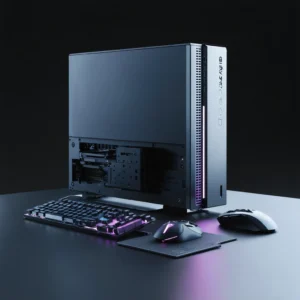
Introduction: Battling the Temptation of Savings
When you build your perfect computer, you search for high quality yet affordable components. Consequently, many people consider buying used parts to save money. However, you must remember that some components, such as power supplies, can jeopardize your system if they fail. Moreover, experts recommend that you avoid secondhand power supplies despite attractive price tags. In addition, seasoned builders emphasize safety and reliability over short-term savings. Therefore, you must consider the following risks before making a decision.
Understanding the Role of a Power Supply
A power supply unit (PSU) converts alternating current to the direct current that your computer components require. Hence, a PSU stands as the heart of your system. Without stable power, your machine can crash unexpectedly. Furthermore, you must appreciate that even a minor flaw can cause cascading hardware failures. To further elaborate, check out this table that encapsulates the main functions of a power supply:
| Function | Description |
|---|---|
| Voltage Conversion | Transforms AC into regulated DC needed by internal components. |
| Power Regulation | Stabilizes current to protect devices from power surges. |
| Efficiency | Reduces energy waste by delivering power effectively. |
This table proves that a PSU carries immense responsibility, and even slight deterioration can significantly harm overall performance.
The Risks of Purchasing a Used Power Supply
When you pick up a used PSU, you expose yourself to several risks. First, used items weather performance issues after consistent use and time. Additionally, many power supplies undergo wear and tear that you cannot immediately detect. For example, look at the following list outlining primary risks:
- Electrolytic Capacitor Deterioration
- Hidden Physical Damage
- Loss of Efficiency
- Absence of Warranty or Manufacturer Support
Moreover, you face challenges in determining the true operational history of a used component. Similarly, you must consider that even small, seemingly insignificant malfunctions can result in larger issues. Consequently, building your computer with a used PSU means inviting potential complications.
4 Reasons Why You Should Avoid a Used Power Supply
Reason 1: Safety Hazards
Safety constitutes your top priority. A used power supply exposes you to overheating, short circuits, and electrical fires. In addition, unseen internal failures increase risk significantly. Therefore, you must invest in a new power supply that meets modern safety standards. Moreover, safety testing and certifications reassure you that your PSU remains free of hidden defects.
Reason 2: Reduced Reliability
Reliability depends on quality and age. A used power supply might perform irregularly, causing unstable operation. Furthermore, failing components could lead to abrupt shutdowns and system instability. You can see a step-by-step breakdown of these issues:
- Irregular Voltage Output – Causes failures in sensitive hardware.
- Unstable Performance – Results in unplanned system restarts.
- Shortened Lifespan – Accelerates overall system wear and degradation.
Consequently, you benefit from upgraded models engineered with enhanced technology. Additionally, new models deliver consistent performance, especially during high loads.
Reason 3: Lack of Warranty and Support
Warranty protects investments through manufacturer guarantees and support. However, you lose these benefits when choosing a used power supply. Furthermore, retailers usually do not back secondhand items. As a result, you face difficulty in obtaining assistance if the component malfunctions. Moreover, imagine a situation where you face critical system failure, and obtaining a replacement becomes nearly impossible. In contrast, updated products supply smooth customer service, which guarantees future support. Thus, you must prioritize a fresh unit that offers peace of mind.
Reason 4: Hidden Signs of Wear
Hidden wear challenges even the most careful buyer. Even if a used power supply appears visually appealing, it may hide compromised internal parts. For example, consider the warning signs:
- Bulging or leaking capacitors
- Discolored components
- Overheated circuitry revealed after careful inspection
Naturally, you risk using a PSU with unseen damage that leads to system failures later. Consequently, you should lean towards a new product that minimizes surprises and safeguards your computer’s health.
How to Save Money Without Compromising Quality
You can economize without sacrificing quality if you investigate thoroughly. For instance, follow these tips for a reliable build:
- Purchase certified components from trusted vendors.
- Watch for sales and seasonal discounts on new units.
- Read reviews and consult expert guides when needed.
Furthermore, you may seek refurbished units that include warranties and professional testing. Additionally, many reputable sellers verify parts before resale. Consequently, you achieve a balance between cost-effectiveness and quality assurance.
Expert Insights and Industry Perspectives
Industry experts voice concerns regarding used power supplies repeatedly. They argue that many issues emerge from neglecting internal inspection. Thus, many professionals recommend that computer collectors invest in new power supplies. Additionally, they cite advanced protection technologies in modern units that deliver extra stability. Furthermore, experts believe that saving a few dollars does not justify potential risks. As an illustration, consider this table comparing used versus new power supplies, highlighting critical features:
| Feature | Used PSU | New PSU |
|---|---|---|
| Warranty | None or limited | Standard full warranty |
| Inspection Certainty | Low and uncertain | Strict quality control |
| Potential Flaws | High probability | Minimized risk |
| Safety Standards | Possibly outdated | Up-to-date certifications |
Indeed, experts provide actionable advice that remains relevant. Moreover, they encourage you to consider long-term benefits instead of immediate savings.
Conclusion: Making an Informed Decision
Ultimately, you must acknowledge that taking shortcuts on critical components like power supplies consistently leads to unforeseen problems. Therefore, you should invest in quality over cost-saving when assembling your ideal computer. Furthermore, you increase system longevity and safeguard valuable hardware by selecting new parts. In addition, you eliminate the risks associated with wear and hidden defects. Consequently, this advice aligns with strong principles of system stability and user safety. Lastly, you possess the power to shape a reliable setup that supports generations of high-performance work. Clearly, you must prove that quality always triumphs over saving a few dollars in the long run.







